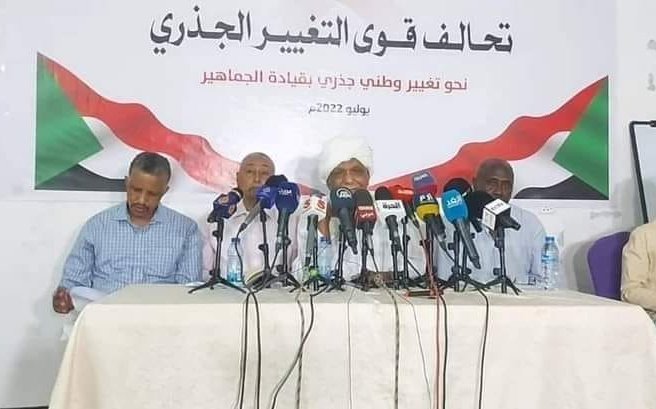Communist Party establishes new coalition for radical change in Sudan
July 24, 2022 (KHARTOUM) – A new political alliance “Forces for Radical Change (FRC)” led by the Sudanese Communist Party (SCP) and comprising a number of civil and trade union groups was announced in Khartoum on Sunday.
The new coalition is established 21 months after the SCP withdrew from the Forces for Freedom and Change (FFC) on November 7, 2020. At the time, the left party accused some groups of the broad coalition of colluding with internal and external forces against the revolution. Also, the party its departure was motivated by the adoption of economic reforms in agreement with international financial institutions.
The FRC includes a number of labour movements and civil society groups such as the Sudanese Professionals Association, the Union of Farmers in Al-Jazirah and Managuel, and the Sudanese Women’s Union. Historically, these groups are known to be close to the Communist Party, which has been relying on trade unions and civil society groups to promote its political goals and principles.
Before announcing the new coalition, the Communist Party reached out to the SPLM-N led by Abdel-Aziz al-Hilu) and the SLM) of Abdel Wahid al-Nur. However, the two non-signatory groups are not among their members. The same for the Resistance Committees as many of the neighbourhood bodies say are keen to preserve their independence.
The goals of the new umbrella aimed at bringing down the coup and achieving a radical revolutionary change said the SCP Political Secretary Mohamed Mokhtar al-Khatib on Sunday.
The founding statement stressed the FRC’s rejection of “the military institution’s interference in politics and the rejection of any partnership with it”. Also, it underscored the need to decide on “deferred issues” and resolve them during the transitional period, alluding to the separation of religion from the state.
Al-Khatib told a press conference in Khartoum that the Forces for Freedom and Change (FFC) will not be part of the coalition, because they represent the interests of “social classes coexisting with the social-political approach that caused the destruction of national resources for more than 60 years of independence.
He stressed that the FFC still believe in a settlement with the military component, and ruled out the participation of the Sudanese Revolutionary Front, including signatory groups because they are cooperating with the military, as he said. But, he did not speak about the National Consensus coalition which is seen as part of the coup.
The FRC goals include ending economic underdevelopment and dependency on the international community, building a state of citizenship, human rights, equality, justice, and ensuring a just distribution of wealth.
The Communist Party has been known for its opposition to economic reforms adopted by the transitional government in agreement with the International Monetary Fund (IMF) and the World Bank, on the grounds that these reforms increase the dependence on the national economy.
With this new political coalition, the original FFC, established in January 2019, has been divided into three organizations: the Forces for Freedom and Change – the Executive Office, National Consensus and the Forces for Radical Change.
The announcement of the new coalition, also, comes after the announced decision of the military component to not take part in the next transitional government.
The leaders of the new leftist alliance did not announce the list of the groups and organizations that signed the founding charter, but they pledged to reach out to the ” Radical Forces of the Revolution” and organize with them in order to build a grassroots alliance aligned with the interests of the masses.
They renewed calls for “Radical Forces” in the capital and state Resistance Committees, farmers’ unions and organizations, displaced persons’ coordination, revolutionary gatherings at work sites, and revolutionary bodies to organize themselves and join them.
(ST)

